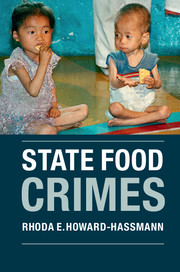1 - State Food Crimes
from Part I - Introduction and Background
Published online by Cambridge University Press: 05 August 2016
Summary
This book discusses state food crimes; that is, crimes by states that deny their own citizens and others for whom they are directly responsible one of their most fundamental human rights, the right to food. The worst type of deprivation of food is famine. Not only are famines not pure natural disasters, they are often consequences of national policy decisions that benefit political elites at the expense of the populations whose well-being is entrusted to them. As de Waal argues, “The occurrence of famine is an indictment of the ethics of the country in which it has occurred” (de Waal 1991, 77). Through the use of four late twentieth and early twenty-first century case studies described in Part II, this book demonstrates that some states – or political elites in those states – deliberately deprive their citizens of food while others neglect to ensure that their citizens, or others for whom they are responsible, have adequate nutrition. The four cases are North Korea in the 1990s and twenty-first century; Zimbabwe since 2000; Venezuela since 1999; and the West Bank and Gaza (WBG) in the 1990s and twenty-first century. The factual descriptions of food policies in these countries end as of April 2015.
I draw these four cases from different areas of the world and different political systems. North Korea, an Asian country, was a pseudo-Communist dynastic regime. Zimbabwe in the 2000s became an authoritarian regime ruled by a small clique of family and allies surrounding President Robert Mugabe. Venezuela was ruled from 1999 to 2013 by an increasingly authoritarian populist, Hugo Chávez, succeeded by Nicolás Maduro, who intensified Chávez's policies. Israel, internally a democracy, was an occupying power in the West Bank and exercised effective control over Gaza.
Many countries in which famine exists are at war. I have deliberately chosen three cases – North Korea, Zimbabwe, and Venezuela – in which war is not a complicating variable. In the case of WBG, the Gaza War of 2009 is one reason why Palestinians suffered malnutrition, but the main reason for malnutrition in the West Bank was colonialism. I have also chosen states with functioning (however corrupt or malevolent) governments, rather than failed states: thus, for example, I have chosen Zimbabwe over Somalia.
- Type
- Chapter
- Information
- State Food Crimes , pp. 3 - 21Publisher: Cambridge University PressPrint publication year: 2016



